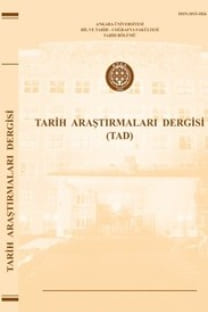Georgios Akropolites ve “Tarih” Adlı Eseri
Georgios Akropolites, Türkiye Selçukluları, Bizans
George Akropolites and His Work “The History”
Georgios Akropolites Turkey Seljuqs, Byzantine State, XIIIth Century,
___
- Angelov, Dimiter, Imperial Ideology and Political Thought in Byzantium (1204-1330), Cambridge University Press 2007.
- Ayönü, Yusuf, Selçuklu-Bizans Münasebetleri, Ege Üniversitesi Sosyal Bilimler Enstitüsü, Tarih Anabilim Dalı Yayımlanmamış Doktora Tezi, İzmir 2007.
- Bekker, Immanuel, Annales, Bonnae 1836.
- Blum, Von Wilhelm, Die Chronik Georgios Akropolites, A. Hiersemann, Stuttgart 1989.
- Haldon, John, Bizans Tarih Atlası, çev. Ali Özdamar, İstanbul 2007.
- Heisenberg, A., Historia, Georgii Acropolitae Opera, 2 Cilt, Leipzig 1903.
- Katsaros,Vasiles, Georgios Akropolites, Chronike Syngraphe, Ekdoseis Zetros, Selanik 2004.
- Korobeinikov, Dimitri A., Byzantium and Turks in the Thirteenth Century, Unpublished Ph.D Thesis, Oxford University 2003
- Lehmann, Bruno, Die Nachrichten des Niketas Choniates, Georgios Akropolites und Pachymeres über die Selcuqen in der Zeit von 1180 bis 1280 n. Chr., Inaugural- Dissertation, Leipzig 1939.
- ________, ____, “Theodor I. Laskaris 1204-22 ve I. Gıyaseddin Keyhüsrev”, Çev. Mihin Eren, Selçuklu Araştırmaları Dergisi, 3 (1971), s. 593-598.
- Macrides, Ruth, A Translation and Historical Commentary of George Akropolites’ History, Unpublished Ph.D Thesis, London 1978.
- ________, ____, George Akropolites: The History, Edited and Translated by Ruth Macrides, Oxford 2007.
- Panagiotou, Antonios D., Georgios Akropolites, Chronike Syngraphe, Ekdoseis Kanake, Atina 2003.
- Savvides, Alexis G. C. “Acropolites and Gregoras on The Byzantine-Seljuk Confrontation at Antioch-on-The Meander (A.D. 1211) English Translation and Commentary”, Tarih Araştırmaları Dergisi, XV/26 (1990-1991), s. 93-102.
- Wirth, P., Georgii Acropolitae Opera, 2 Cilt, Stutgart 1978.
- Zhavoronkov, P. I., Georgios Akropolites, Istoriia, G. G. Litavrin, Saint Petersburg 2005.
- ISSN: 1015-1826
- Yayın Aralığı: 2
- Başlangıç: 1963
- Yayıncı: Levent KAYAPINAR
The Missing God Telipinu Myth: A Chapter from the Ancient Anatolian Mythology
Georgios Akropolites ve “Tarih” Adlı Eseri
Kayıp Tanrı Telipinu Mitosu: Eskiçağ Anadolu Mitolojisinden Bir Kesit
İlkçag Tarih Yazımının Batı Anadolulu Öncüleri: IV-Lesboslu Hellanikos
Atina Katalanları ve Ege Bölgesinde Türk Yayılmasının Baslaması
Elizabeth A. ZAZHARIADOU, Serdar ÇAVUŞDERE
Mübadeleden Kurtulma Çabası Olarak: İhtidâ
